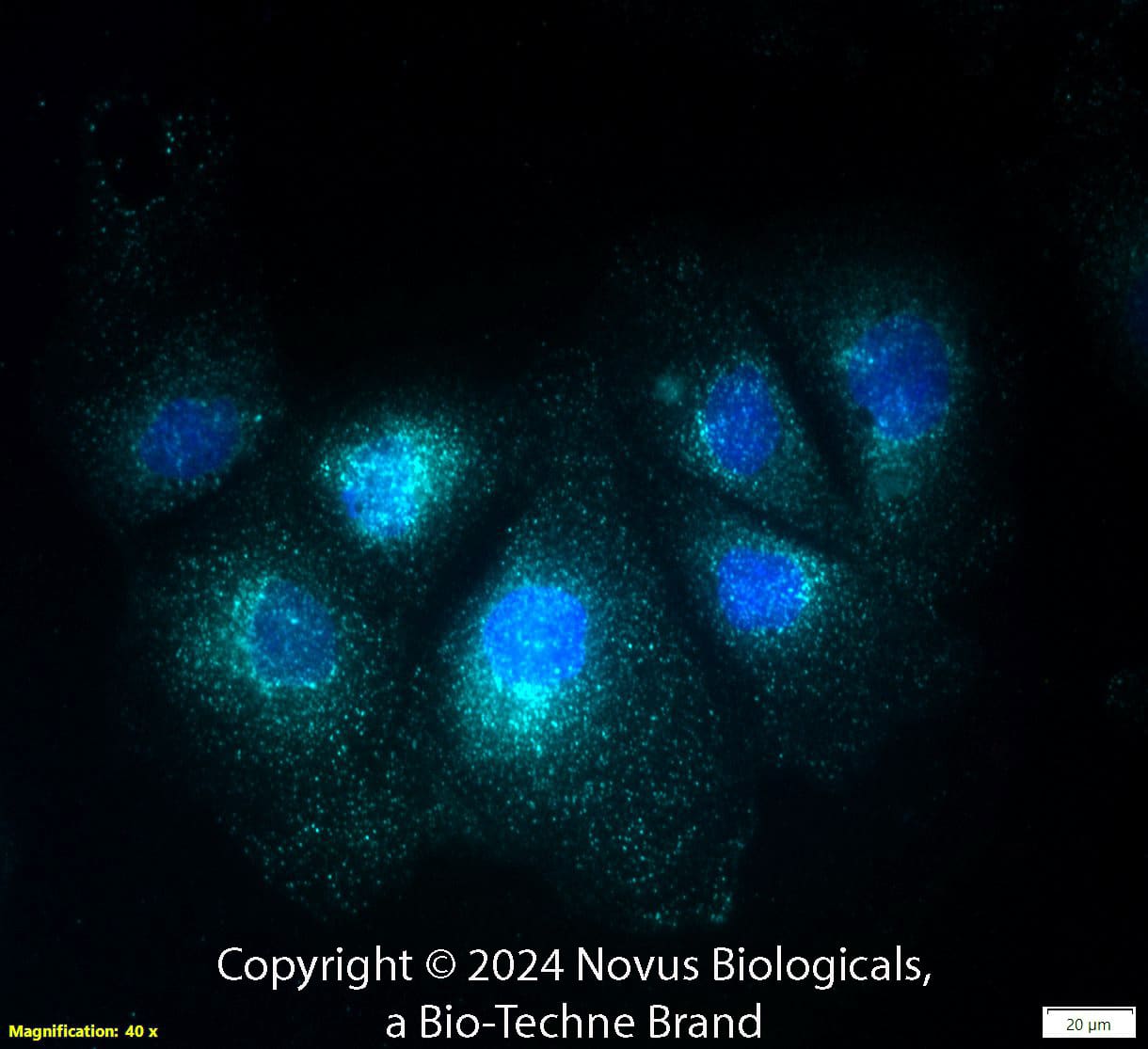A20/TNFAIP3 Antibody (59A426) - BSA Free
Novus Biologicals, part of Bio-Techne | Catalog # NBP1-77533

![Western Blot: A20/TNFAIP3 Antibody (59A426)BSA Free [NBP1-77533] Western Blot: A20/TNFAIP3 Antibody (59A426)BSA Free [NBP1-77533]](https://resources.bio-techne.com/images/products/A20-TNFAIP3-Antibody-59A426-Western-Blot-NBP1-77533-img0005.jpg)
Conjugate
Catalog #
Forumulation
Catalog #
Key Product Details
Species Reactivity
Validated:
Human, Mouse, Rat
Cited:
Human, Mouse
Applications
Validated:
CyTOF-ready, Flow (Intracellular), Flow Cytometry, Immunocytochemistry/ Immunofluorescence, Immunohistochemistry, Immunohistochemistry-Paraffin, Immunoprecipitation, Simple Western, Western Blot
Cited:
Immunocytochemistry/ Immunofluorescence, Western Blot
Label
Unconjugated
Antibody Source
Monoclonal Mouse IgG1 kappa Clone # 59A426
Format
BSA Free
Concentration
1.0 mg/ml
Product Specifications
Immunogen
Full length recombinant human A20/TNFAIP3 Antibody (59A426). The epitope has been mapped to the C-terminal portion of A20 (amino acids 440-790)
Clonality
Monoclonal
Host
Mouse
Isotype
IgG1 kappa
Scientific Data Images for A20/TNFAIP3 Antibody (59A426) - BSA Free
Western Blot: A20/TNFAIP3 Antibody (59A426)BSA Free [NBP1-77533]
Western Blot: A20/TNFAIP3 Antibody (59A426) [NBP1-77533] - Human Jurkat lysate probed with A20 antibody at 4 ug/ml.Flow Cytometry: A20/TNFAIP3 Antibody (59A426) - BSA Free [NBP1-77533]
Flow Cytometry: A20/TNFAIP3 Antibody (59A426) [NBP1-77533] - An intracellular stain was performed on SK-MEL-28 cells with A20/TNFAIP3 (59A426) antibody NBP1-77533AF647 (blue) and a matched isotype control (orange). Cells were fixed with 4% PFA and then permeablized with 0.1% saponin. Cells were incubated in an antibody dilution of 2.5 ug/mL for 30 minutes at room temperature. Both antibodies were conjugated to Alexa Fluor 647.Simple Western: A20/TNFAIP3 Antibody (59A426)BSA Free [NBP1-77533]
Simple Western: A20/TNFAIP3 Antibody (59A426) [NBP1-77533] - Lane view shows a specific band for A20/TNFAIP3 in 0.05 mg/ml of Jurkat lysate. This experiment was performed under reducing conditions using the 12-230 kDa separation system.Applications for A20/TNFAIP3 Antibody (59A426) - BSA Free
Application
Recommended Usage
Flow (Intracellular)
2.5 ug/ml. Use reported in scientific literature (Hjelmeland (2010))
Flow Cytometry
2.5 ug/ml
Immunocytochemistry/ Immunofluorescence
10 ug/ml
Immunohistochemistry
5 - 10 ug/ml
Immunohistochemistry-Paraffin
5 - 10 ug/ml. Use reported in scientific literature (Metellus (2010))
Immunoprecipitation
1-2 ug/ml
Simple Western
1:100
Western Blot
2-4 ug/ml
Application Notes
Multiple A20 cleavage fragments have been described in Western Blot, see Coornaert (2008) and Hailfinger (2009) for additional details.
In Simple Western only 10 - 15 ul of the recommended dilution is used per data point.
See Simple Western Antibody Database for Simple Western validation: Tested in Jurkat lysate 0.05 mg/mL, separated by Size, antibody dilution of 1:100, apparent MW was 102 kDa. Separated by Size-Wes, Sally Sue/Peggy Sue. This antibody is CyTOF ready.
In Simple Western only 10 - 15 ul of the recommended dilution is used per data point.
See Simple Western Antibody Database for Simple Western validation: Tested in Jurkat lysate 0.05 mg/mL, separated by Size, antibody dilution of 1:100, apparent MW was 102 kDa. Separated by Size-Wes, Sally Sue/Peggy Sue. This antibody is CyTOF ready.
Formulation, Preparation, and Storage
Purification
Protein G purified
Formulation
PBS
Format
BSA Free
Preservative
0.02% Sodium Azide
Concentration
1.0 mg/ml
Shipping
The product is shipped with polar packs. Upon receipt, store it immediately at the temperature recommended below.
Stability & Storage
Store at -20C. Avoid freeze-thaw cycles.
Background: A20/TNFAIP3
A20/TNFAIP3 is a highly conserved protein sharing >90% amino acid sequence identity across various mammalian species and is highly expressed in T-cell and B-cells. Coding and non-coding single nucleotide polymorphisms (SNPs) of A20/TNFAIP3 have been associated with multiple autoinflammatory and autoimmune diseases including type 1 diabetes, rheumatoid arthritis, Crohn's disease, and systemic lupus erythematosus (SLE) (3). The two domains of A20/TNFAIP3 cooperate to regulate NF-kB signaling. Its N-terminal ovarian tumor (OTU) domain contains a catalytic cysteine (C103) which functions as a K63 deubiquitinase, whereas the 7 zinc fingers that make up the C-terminal domain mediate K48 polyubiquitination. To regulate NF-kB signaling, A20/TNFAIP3 removes K63-polyubiquitin chains from receptor-interacting protein 1 (RIP1) and NF-kB essential modulator (NEMO), thus preventing interactions with downstream partners. A20/TNFAIP3 also contributes to the degradation of RIP1 and Ubc13 through the addition of K48 polyubiquitin chains (4).
References
1.Dixit VM1, Green S, Sarma V, Holzman LB, Wolf FW, O'Rourke K, Ward PA, Prochownik EV, Marks RM. (1990) Tumor necrosis factor-alpha induction of novel gene products in human endothelial cells including a macrophage-specific chemotaxin. J Biol Chem. 265(5):2973-8. PMID: 2406243
2.Verstrepen L, Verhelst K, van Loo G, Carpentier I, Ley SC, Beyaert R. (2010) Expression, biological activities and mechanisms of action of A20 (TNFAIP3). Biochem Pharmacol. 80(12):2009-20. PMID: 20599425
3.Mele A, Cervantes JR, Chien V, Friedman D, Ferran C. (2014) Single nucleotide polymorphisms at the TNFAIP3/A20 locus and susceptibility/resistance to inflammatory and autoimmune diseases. Adv Exp Med Biol. 809:163-83. PMID: 25302371
4.Das T, Chen Z, Hendriks RW, Kool M. (2018) A20/Tumor Necrosis Factor alpha-Induced Protein 3 in Immune Cells Controls Development of Autoinflammation and Autoimmunity: Lessons from Mouse Models. Front Immunol. 9:104. PMID: 29515565
Additional A20/TNFAIP3 Products
Product Documents for A20/TNFAIP3 Antibody (59A426) - BSA Free
Product Specific Notices for A20/TNFAIP3 Antibody (59A426) - BSA Free
This product is for research use only and is not approved for use in humans or in clinical diagnosis. Primary Antibodies are guaranteed for 1 year from date of receipt.
Loading...
Loading...
Loading...
Loading...
Loading...
Loading...
![Flow Cytometry: A20/TNFAIP3 Antibody (59A426) - BSA Free [NBP1-77533] Flow Cytometry: A20/TNFAIP3 Antibody (59A426) - BSA Free [NBP1-77533]](https://resources.bio-techne.com/images/products/A20-TNFAIP3-Antibody-59A426-Flow-Cytometry-NBP1-77533-img0013.jpg)
![Simple Western: A20/TNFAIP3 Antibody (59A426)BSA Free [NBP1-77533] Simple Western: A20/TNFAIP3 Antibody (59A426)BSA Free [NBP1-77533]](https://resources.bio-techne.com/images/products/A20-TNFAIP3-Antibody-59A426-Simple-Western-NBP1-77533-img0008.jpg)
![Immunohistochemistry-Paraffin: A20/TNFAIP3 Antibody (59A426) - BSA Free [NBP1-77533] Immunohistochemistry-Paraffin: A20/TNFAIP3 Antibody (59A426) - BSA Free [NBP1-77533]](https://resources.bio-techne.com/images/products/A20-TNFAIP3-Antibody-59A426-Immunohistochemistry-Paraffin-NBP1-77533-img0010.jpg)
![Immunocytochemistry/ Immunofluorescence: A20/TNFAIP3 Antibody (59A426) - BSA Free [NBP1-77533] Immunocytochemistry/ Immunofluorescence: A20/TNFAIP3 Antibody (59A426) - BSA Free [NBP1-77533]](https://resources.bio-techne.com/images/products/A20-TNFAIP3-Antibody-59A426-Immunocytochemistry-Immunofluorescence-NBP1-77533-img0016.jpg)
![Immunocytochemistry/ Immunofluorescence: A20/TNFAIP3 Antibody (59A426) - BSA Free [NBP1-77533] Immunocytochemistry/ Immunofluorescence: A20/TNFAIP3 Antibody (59A426) - BSA Free [NBP1-77533]](https://resources.bio-techne.com/images/products/A20-TNFAIP3-Antibody-59A426-Immunocytochemistry-Immunofluorescence-NBP1-77533-img0018.jpg)
![Flow Cytometry: A20/TNFAIP3 Antibody (59A426) - BSA Free [NBP1-77533] Flow Cytometry: A20/TNFAIP3 Antibody (59A426) - BSA Free [NBP1-77533]](https://resources.bio-techne.com/images/products/A20-TNFAIP3-Antibody-59A426-Flow-Cytometry-NBP1-77533-img0017.jpg)
